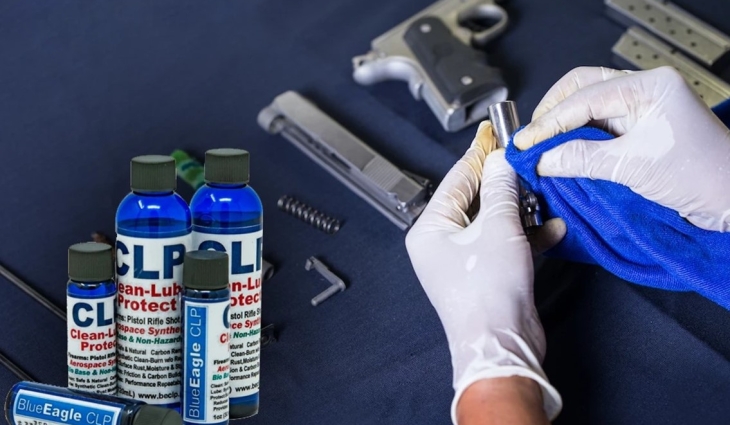BlueEagle Blog

Why Regular Handgun Cleaning Matters
Whatever firearm you use thorough cleaning keeps your firearms operating smoothly and prevents many common issues associated with poorly maintained guns.
It is important to follow proven, practical and simple firearm cleaning and maintenance steps. Whatever firearm you use thorough cleaning keeps your firearms operating smoothly and prevents many common issues associated with poorly maintained guns. It is important to follow proven, practical and simple firearm cleaning and maintenance steps. Regular dismantling your gun and thoroughly cleaning the internal elements helps maintain a well-functioning firearm with a longer lifespan. Below are solid reasons why regular handgun cleaning matters.
1. Understand Mechanics of Your Firearm
Clean your gun reveals all of the inner components function and how the parts interact to of propelling a round. Learning about the internal elements provides a new level of respect for the firearm. You’ll learn why your gun needs cleaning, how often you should do so and what parts collect the most dirt and residue.
2. Ensure Reliability and Safety
Thorough and regular maintenance keeps your firearm in top working order. Cleaning remove any gunk or buildup and ensures that it operates at top performance. It’s essential that your firearm always performs when you need it most.Each time you shoot, residual fouling, which consists of particles from the bullet and burnt gunpowder, sticks in the barrel. Continually applying oil and lubricant attracts residue, dust and dirt. Overtime this causes the firearm to gum up, potentially ending in a firing failure or preventable repairs.The collected barrel gunk also decreases precision which affects sport shooters’ accuracy as well. For home or self-defense, precision and overall reliability are very important. Regular cleaning and maintenance ensures that your firearm is reliable and is safe to use.
3. Increase Longevity
Depending on how you care for your firearms, they can last a few years to generations. Routine maintenance significantly lengthen the lifespan of your firearm; obviously, the frequency it is used determines how often a proper cleaning is needed. It’s your choice and depends on use and how long you want your it to last.The best handgun maintenance requires cleaning, lubricating and proper storage. For wood grips add a wax or polish in the routine since the more thorough you are, the fewer parts you’ll need to replace over time.
4. Learn Proper Lubrication
Lubrication - maintenance is a Biggy! Handguns differ and finding the right balance which means that the better you get to know your firearm, the easier it’ll be to find that balance. Over - too much oil collected in parts of the handgun sorta glues particles and debris (unburned powder and carbon fouling). Constant oiling but not cleaning your firearm ‘gumming’. Pretend it’s your hands, clean often! Under lubrication is still essential since it reduces oxidization. The primary aim of oiling your gun is to reduce friction and preserve the mechanisms that touch one another. If you aren’t sure what to lubricate, take apart the firearm and look for wear marks and – that’s where to apply lubricant.
5. Avoid Major Issues
Good cleaning habits prevent common issues from bullet trajectory to your gun’s operation as a whole. Keeping your firearm functioning with simple regular cleaning. Proper maintenance prevents:
- Rusting: Rusting handguns happen with improper storage and outdoor use as they are exposed to humidity and the water in the air. Corrosive ammunition also causes inside barrel because the primer leaving ignited sales behind. Applying too much solvent without cleaning also causes rusting and pitting. Solution: with routine cleaning and proper storage in between firearm use you eliminate all of these problems.
- Residual fouling buildup: Each bullet that passes through your firearm creates barrel fouling which leaves behind remnants of carbon from the gunpowder, and trace amounts of lead and copper. The residual fouling builds up in the barrel and affects both the firearm’s precision and reliability.
- Failure to fire: Indicates that the firearm isn’t regularly cleaned. Handgun residue build-ups, it may simply fail to fire. Also, the live round could blow up in the gun, which is incredibly dangerous. Cleaning significantly reduces your chances of experiencing a failure to fire. Do it!
- Failure to feed (FTF): If a lubricant goes where it shouldn’t - over oiled firearm seeps into areas that shift rounds from the magazine to the chamber and causes an FTF (meaning the round never gets to the chamber … despite activation.) Regular cleaning lessens over-lubrication and ensures the mechanisms are functioning properly.
- Failure to eject (FTE): While the other two failures sees the round never leaving the gun, FTE is when the casing jams in the barrel. While annoying, it is less dangerous than the ‘fire’ and ‘feed’, it can be prevented with regular cleaning.


